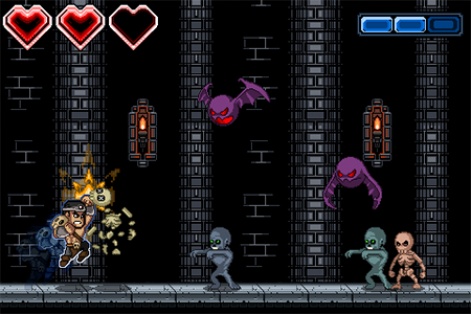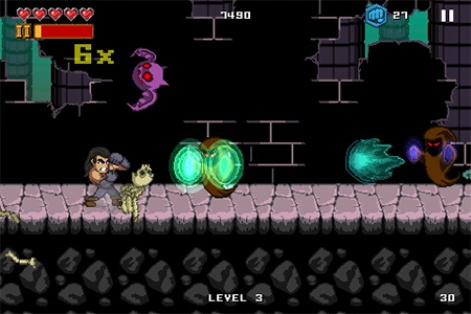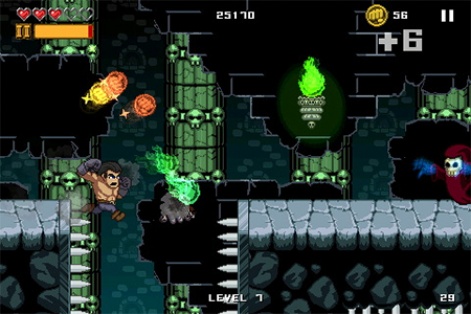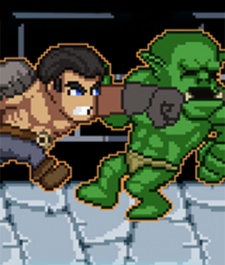Yet despite this, the endless puncher famously failed to generate much income - a situation that eventually forced the developers to abandon the games free-to-play model.
In our latest 'making of', we talk to RocketCat's Kepa Auwae about what inspired Punch Quest, how it brought fresh ideas to a familiar genre, and that painful journey from freemium to premium.
Fighting talk
Punch Quest started life as a physics-based fighting game designed by Paul Pridham, of Canadian outfit Madgarden.
"In the earliest design, the game was a lot more about keeping your own character in the air, as opposed to straight-up fighting," says Auwae. "Like punching bats to soar over hazards"
"That quickly turned into a more combat focused design. We wanted to make a fighting game, but for a wider audience, taking inspiration from the likes of Final Fight, Golden Axe and Street Fighter."

An early build of Punch Quest
In doing so, the duo strived to right some of the wrongs they had identified in the genre.
"A lot of action games have stilted, mechanical fighting systems," says Auwae. "'Use Move A' when 'Enemy vulnerable to Move A is onscreen, that kind of stuff."
So instead Punch Quest was designed to be far more fluid, offering players numerous possibilities in combat despite the games limited two-button set-up.
"The combat in Punch Quest has a lot of subtleties and parts that interact with each other," explains Auwae. "There's a lot of leeway as to what you can do in different situations, and opportunities to improvise."
Endless punching
In addition to a fresh spin on combat, Madgarden and RocketCat also did away with the need for directional controls, by adopting an endless runner style design.
Mobile platforms are overflowing with endless runners, yet despite their ubiquity Auwae believes there's plenty of room to introduce new ideas.
"The only requirement of an endless runner is really 'your character runs forward automatically'," he says.
"We went for a combination of endless runner and arcade fighter, but theres lots of genres it could be mixed with and there are plenty of other directions for developers to take"
Ultimately, it was about finding a comfortable middle-ground between the familiar and the unique in an effort to bring the game to a wide consumer base.
"There aren't a ton of games on the App Store that are like arcade fighting games," says Auwae, reflecting on Punch Quests pop at a gap in the market.
"At least, not as many compared to the platforming-based endless runners."
Fighting with freemium
From the outset it was decided that Punch Quest would adopt a freemium model, in a further attempt to broaden appeal.
"I knew it was risky," says Auwae. "I knew that you have to get a lot of downloads to make money out of F2P, and even then it could go either way.
"I thought if nothing else, it would expand our audience."

The idea was simple, with the games IAP model focusing on "very little grinding to get your abilities and powers, but with high end cosmetic and functional money sinks."
Initially it looked as though the approach would work. After nine months developing the game using Madgarden's proprietary engine, Punch Quest hit the App Store in October and it quickly picked up momentum.
Word spread with the help of fellow developers, favourable press, user reviews and - most importantly - several high-profile featured spots on the App Store.
Before long Punch Quest slugged its way into the higher reaches of the free apps chart, amassing well in excess of 600,000 downloads.
Sucker punch
The problems began when Auwae noticed that the IAP conversion rates for the game were perilously low.
Despite the high download numbers, revenue figures sat just above the $10,000 mark around three weeks after launch, not nearly enough for a two man team that had put the best part of a year into the project.
What followed was a series of quick fire updates to the games IAP model in an attempt to turn things around.
"The first things we did were add more expensive items to buy, made the "BUY IAP" button more obvious, and added a much requested coin doubler," says Auwae.
Yet the update still wasnt enough to garner a significant change in player behaviour.
"We've been doing tweaks past that," says Auwae, "but it became obvious that the real problem is simply that we were way too generous with the progression system."
"While most free games make you wait minutes to hours between the next upgrade, we pretty much give you an upgrade or new ability or power every single match."
Auwae says that he sheer number of unlockables ultimately worked against player investment.
"We have tons of them," he says, "but it turns out that the total length of the progression matters way less than the time between upgrades."
Premium pugilism
On November 14th, Punch Quest's free-to-play model was abandoned in favour of a 99c price point with IAP, in an attempt bring in some much-needed cash.
Yet Auwae remains pessimistic. "Making it 99 cents has made it perform OK," he says, "but that won't last."
"Paid games tend to make money for a certain amount of time, and then that flows down into a tiny trickle. There are exceptions to this, games that stick in the Top 50 charts forever, but there can only be so many exceptions at a time."

In an effort to get the best of both worlds and combat this inevitable decline Auwae says, "We're thinking that we'll have to adjust the in-game prices, then go free again."
Yet the reality remains that Punch Quest is a missed opportunity. Hugely popular and brilliantly entertaining, the games window for great success looks to have passed.
Auwae is looking to the positives. "Now a lot more people know about us," he says. "The success of our next game is much more likely, due to all the downloads and coverage weve received.
Preparing for the next bout
Development of RocketCat's next project is already underway, with the working title of Mage Dungeon.
"We're making a followup to Mage Gauntlet, which was our Super Nintendo RPG inspired action-adventure game," says Auwae. "It will have random dungeons and multiple character classes."
"The IAP system is based around unlocking new characters to play as, though you can also unlock them through playing the game. "
Auwae doesnt see any other option, on mobile platforms at least, but to give freemium another go.
"We're still trying the free plus IAP model with our next game, mostly because we don't see a future for us in continuing to charge $2.99 for iOS games," he says.
"Our other choices are to leave iOS as our main platform, so we can charge more than $3 for a game, or to make much simpler games.
"If we want to stay on iOS and keep making complex games that take months to create, we're going to have to make free plus IAP work.
"If it isn't successful, we'll have to look into our other options."





















